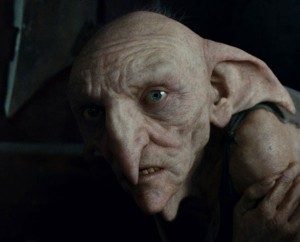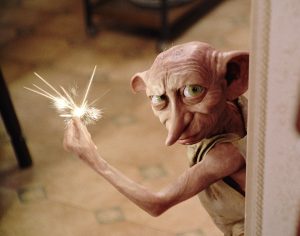Wizarding WReform: Elf Rights
Like Hermione, readers were dismayed to discover that a form of slavery exists in the wizarding world. Wizards have magic at their fingertips yet force an entire race of other beings to do their bidding, often in cruel conditions? And even worse, the slaves are happy to work without pay, quick to punish themselves for disobedience, insulted by the suggestion of freedom, and devastated if released from bondage? And most wizards aren’t particularly bothered by this? Even those who are bothered by it simply see it as the way of the world. It is accepted as the nature of elves to toil in servitude, and therefore, any attempts to change their situation beyond treating them nicely would appear to be in vain.

Hermione recognizes the practice of elf slavery as a blight on magical society, but her short-term efforts for reform prove less than effective. Many readers were disappointed that the issue still exists at the end of the series and no solution has been provided for elf liberation, but difficult problems embedded over centuries don’t necessarily have overnight fixes. However, the slight progress Hermione achieves by making Harry develop a sense of empathy toward Kreacher and Ron care about the fate of the Hogwarts elves demonstrates that change, though slower than ideal, is possible over time.
There currently seems to be little to no government oversight of house-elf enslavement. The Ministry of Magic should know who owns elves and implement regulations regarding such ownership. The most immediate improvement that could be made in the elfish condition that is unlikely to cause distress to elves is treatment. Corporal punishment, both self-inflicted and inflicted by others, must be forbidden, with the onus on wizards to prevent elves from hurting themselves.
The next step, once all elves are accounted for, is to outlaw domestic elf enslavement. Interestingly, Dobby refers to himself as a free elf, not a house-elf, indicating that the term is connected to an elf’s attachment to a residence rather than their species. While Hermione is horrified that Hogwarts has slave labor, the conditions are clearly better and easier to supervise than at various private mansions spread across the country. Providing safe environments where elves can work, if they so wish, would help them adjust to the idea of freedom. Any locations entrusted to serve as these temporary spaces must not rely solely on elf labor to avoid becoming dependent on an unpaid workforce. Allowing elves to tidy up as they please, rather than requiring anything of them, would move them closer to the helpful creatures of folklore on which they seem to be modeled.
Were house-elves once such beings that were taken advantage of and could be returned to their original state? The origin of elf slavery has never been clear, though we know that it stretches back at least a thousand years to the founding of Hogwarts, when Helga Hufflepuff had the idea to bring elves to the school to protect them from abuse. Research into the magic that holds sway over elves and whatever magical contracts bind them to masters could uncover the mysteries of their subservience and lead to future liberation that they would want for themselves. With more elves gathered together, they would also have more opportunities to communicate with each other, share their experiences, and develop their own ways of thinking.

The true long-term solution is education – for both wizards and elves. Wizards need to acknowledge house-elf enslavement as a problem that requires attention and devote time and effort to building a society that does not treat any being as inferior. Elves need to be made aware of their rights and options, understand that they are deserving of compassion, and learn to advocate for themselves. They won’t necessarily start demanding pay, nor should they be expected to abide by the workings of a wizarding economy. For all we know, elves have their own ideas of labor and different needs that don’t necessarily require money to be met. One thing we do know is that they have powerful magical abilities that are overlooked by wizards. They could develop their own society or their own ways of navigating magical society alongside wizards. There’s no telling what elves could achieve over time if only they were given the opportunity to explore their hidden potential.


